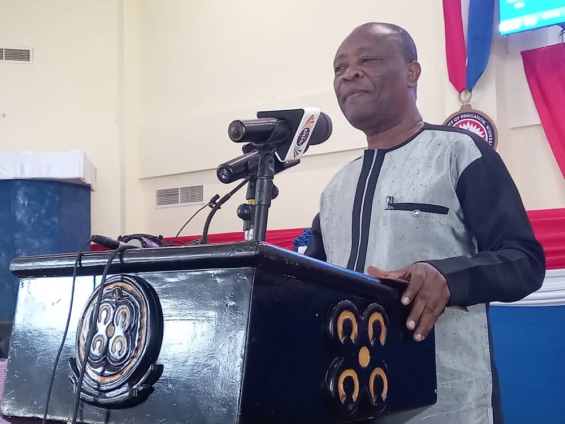A Professor of Educational Leadership at the Institute of Educational Planning and Administration, George Kwaku Toku Oduro, is advocating for a future educational policy targeting less-endowed areas in Ghana.
He said the past and present educational policies had made little impact on the quality and equity components of the Sustainable Development Goal (SDG) 4, especially in disadvantaged rural schools.
Prof Oduro noted that in managing the limited fund available for the Free Senior High School, as an example, the future educational policy must focus more on the poor who could not pay their children’s fees.
“This will ensure fairness and justice, which underpin equity and as such, we may have to learn a lesson from China, who through fairness in distributing educational resources make them what they are today,” he stated.
Prof. Oduro made the suggestion at a maiden lecture series organised by the Institute of Educational Research and Innovation Studies (IERIS) of the University of Education, Winneba (UEW).
It was on the theme: “The State of Education in Ghana: The Past, Present and Future”.
Prof Oduro, who was the guest speaker, shared his views on the theme, focusing on policy reforms from an academic perspective.
He agreed with the adage that ‘the most effective way to destroy people is to deny and obliterate their understanding of their history’, adding that a generation that ignored history had no past and no future.
“It is only when we search the past of policy reforms that our understanding of today’s policy reforms becomes strategically meaningful for the future,” he said.
According to him, policy played a pivotal role in the operations of all sectors of a nation’s economy and explicitly provided a decision framework to stimulate any sector of a nation towards the attainment of its overall development agenda.
“The educational system we inherited from the British has undergone many reforms since our nation was declared a Republic in 1960,” he noted, adding that successive governments had all effected changes in the educational system.
Prof. Oduro said in ensuring that future educational policies were collectively owned by Ghanaians irrespective of political, tribal or religious orientation, governments on the assumption of power must engage the people and implement what is best for them.
“One thing which is affecting education seriously is the fact that we have developed a mentality of not drawing the line between political party leadership and governance, so we have at the district offices for instance, a District Chief Executive who must represent the district behaving like the constituency chairman of party A or Party B."
“People at the top of affairs who are to work for the entire citizenry, behave as political agents, in such a manner that affect educational reforms,” he stressed.
He suggested that government must implement recommendations by committees rather than pushing unapproved reforms.
Also, Prof. Avea E. Nosh, Director of IERIS, said the Institution mentored by UCC, was a research wing of UEW and comprised three centres namely basic education, school and community science and education policy.
According to him the concept for the lecture was conceived as part of the institution’s visibility agenda for UEW and the institution, including the launch of an Annual Education Lecture Series and the Annual State of Education Report.
Meanwhile, Prof. Emmanuel Obed Acquah, who chaired the event on behalf of Prof Mawutor Avoke, Vice Chancellor, stated that discussions on the theme were core to their mandate to drive educational policies relevant to their academic programmes.
“You will agree with me that Ghana has faced several challenges in its education system, of which historically, access to education was limited, especially in rural areas, however, the government made significant efforts to improve access and quality,” he added.
The trajectory of education in Ghana will depend on how these factors evolve and how effectively all stakeholders, including the university, addressed the issues, he added.
Latest Stories
-
We’ll cut down imports and boost consumption of local rice and other products – Mahama
13 mins -
Prof Opoku-Agyemang donates to Tamale orphanage to mark her birthday
1 hour -
Don’t call re-painted old schools brand new infrastructure – Prof Opoku-Agyemang tells gov’t
2 hours -
Sunon Asogli plant will be back on stream in a few weeks – ECG
2 hours -
ECOWAS deploys observers for Dec. 7 election
2 hours -
73 officers commissioned into Ghana Armed Forces
2 hours -
Impending shutdown of three power plants won’t happen – ECG MD
2 hours -
Ghana shouldn’t have experienced any ‘dumsor’ after 2017 – IES Boss
3 hours -
Lamens flouted some food safety laws in re-bagging rice – Former FDA Boss Alhaji Hudu Mogtari
4 hours -
Afcon exit: Our issue is administrative failure and mismanagement, not lack of talent – Saddick Adams
4 hours -
WAPCo to commence major pipeline maintenance and inspection from November 25
4 hours -
CEO of Oro Oil Ghana Limited Maxwell Commey listed among the 100 Most Influential People Awards, 2024
4 hours -
Power crisis: Amandi is off due to maintenance, not debt – ECG Boss
5 hours -
Votes cast for late Akua Donkor to be declared invalid – Electoral Commission
5 hours -
You can’t keep “incompetent” Otto Addo for the long term – Countryman Songo
5 hours

